Is It Time for a Frexit?
Adelina Marini, May 31, 2014
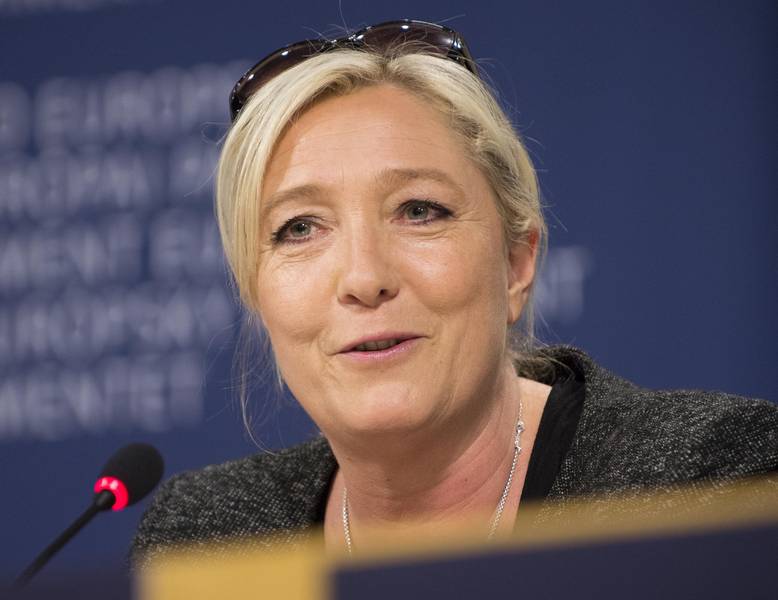 In the peak of the eurozone crisis often the word grexit (Greece+exit) could be heard. The word emerged when the revelations about the real condition of the Greek economy became so many and so hard to comprehend that many analysts believed that it would be easier Greece to survive an exit of the euro area, and therefore the EU, than to be rescued. On the move, though, it was decided that if Greece left the euro area this would mean its end as a whole. Since a year and a half on the agenda has been another word - brexit (Britain+exit) - should UK leave the EU or should it stay? And while brexit is still on the agenda, after the European Parliament elections from May 22-25 it is quite legitimate to ask ourselves the question whether there is a danger of losing France - in other words is there a risk of a frexit?
In the peak of the eurozone crisis often the word grexit (Greece+exit) could be heard. The word emerged when the revelations about the real condition of the Greek economy became so many and so hard to comprehend that many analysts believed that it would be easier Greece to survive an exit of the euro area, and therefore the EU, than to be rescued. On the move, though, it was decided that if Greece left the euro area this would mean its end as a whole. Since a year and a half on the agenda has been another word - brexit (Britain+exit) - should UK leave the EU or should it stay? And while brexit is still on the agenda, after the European Parliament elections from May 22-25 it is quite legitimate to ask ourselves the question whether there is a danger of losing France - in other words is there a risk of a frexit?
The big news this year was not the victory of Nigel Farage's UK Independence Party (UKIP), but that of Marine Le Pen's National Front in France. The party ended up first with 24.95% of the votes, followed by the Union for Popular Movement (UMP), led in the past by former President Nicolas Sarkozy, with 20.79%. The ruling Socialists of Francois Hollande are the biggest loser. They got the support of 13.98% of the voters.
If Marine le Pen is elected president she promises to begin immediately, on day one, consultations about the restoration of the French national currency - the franc - and therefore an exit from the euro area. According to her, France has long ceased to be France and currently is a slave of Berlin and Brussels. This needs to change, she believes. If this happens, the eurozone and the EU at large will cease to exist not very long afterwards.
Why is France so important?
Because France is in the foundation of the EU in the form we know today. It started from the steel and coal agreement concluded between Paris and Berlin right after World War II. Germany and France have been the motors of the European project since the very beginning, planned by far-sighted and, to some extent, idealistic French and German politicians. The Paris-Berlin duo has always been the informal government of the Union which reached remarkable synchrony during the governance of Chancellor Angela Merkel and President Nicolas Sarkozy in the peak of the euro area crisis. It is precisely because of this synchrony the two were nicknamed "Merkozy". They used to appear together even at news conferences after EU summits when crucial decisions were taken to tackle the crisis.
After Hollande won the presidential elections in 2012, however, moreover with insignificant advance before Sarkozy's UMP, the situation has dramatically changed. And in spite of the stated many times sacred Franco-German relation, the magic is no longer there. At the press conferences after the European Council meetings Angela Merkel seems lonely and Francois Hollande focused on himself. It is precisely the Merkozy duo that was at the core of the deepening of the euro-integration as the only logical response to the crisis, provoked by the interconnectedness among the economies in the Economic and Monetary Union (EMU) and fuelled by the different speeds with which these economies move, quelled by the common currency. The bipolar model of governance of the Union, at times, caused serious tensions among the rest of the EU members because it made them feel unequal. Nonetheless, though, the future of the EU seemed stable and in good hands.
After the change of power in the Elysйe and Nicolas Sarkozy's unexpected loss from the unconvincing Hollande, quick variations of the word "exit" have emerged. Britain has immediately used the vacuum to press ahead with its own agenda. And it has succeeded so far. The lack of a strong Franco-German motor gave the centrifugal powers the chance to consolidate and mobilise. The outcome of the European elections shows this unequivocally. And although their potential is still not as destructive as expected, it is more than certain that the future of the EU and especially of the euro area is in danger. UK's stay in the Union is the key to how will developments unfold in the eurozone. Germany continues to insist on continuing the integration there, but without Francois Hollande's help this will not be easy, especially given the risk of a serious resistance in the new European Parliament.
Sarkozy's return
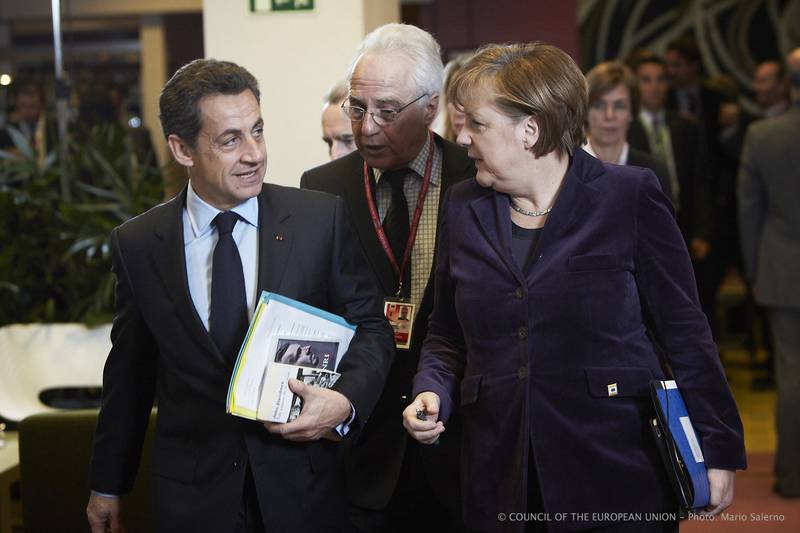 A little before the elections, on French political stage, after almost two years of silence, has returned Nicolas Sarkozy. The moods in the country show that, at the moment, because of the lack of another strong figure or political force, the return of the former French president could prove France's only chance not to be conquered by the pseudo patriotic Front Nacional, because this would mean an end to the Franco-German motor, followed then by an end of the European project whose main task, as the crisis in former Yugoslavia in the end of last century and now in Ukraine has shown, is still maintaining peace.
A little before the elections, on French political stage, after almost two years of silence, has returned Nicolas Sarkozy. The moods in the country show that, at the moment, because of the lack of another strong figure or political force, the return of the former French president could prove France's only chance not to be conquered by the pseudo patriotic Front Nacional, because this would mean an end to the Franco-German motor, followed then by an end of the European project whose main task, as the crisis in former Yugoslavia in the end of last century and now in Ukraine has shown, is still maintaining peace.
The hyperactive French politician, known for his eccentricities, came up with an article for the French weekly Le Point and the German daily Die Welt where he not only defends the European project, but shows willingness this project to be reformed. According to him, not less than half of the EU's current powers should be abolished and member states' sovereignty restored. The common European competences should be "condensed" into no more than ten areas: industry, agriculture, competition, trade policy negotiations, energy, research. The former French head of state believes that all those who want Europe to break-up "forget the lessons of history and will lead us to the abyss". France and Europe are inseparable geographically, historically, culturally and politically. Europe should be supported, Sarkozy appeals in his article.
Marine le Pen, however, calls Nicolas Sarkozy "euro idiot" who no longer believes in France and worships Europe as religion, succumbing systemically to Germany's will. The outcome from the elections now and before show that there is still life in UMP and, moreover, this is the only force that can resist the Front Nacional's йlan. At the European elections in 2009, the Front was fifth with 6.3% and first force was Sarkozy's party which took 27.8% of the votes. The Socialists were third with 16.48%. At the parliamentary elections in 2012, UMP came up second with 27.12 percent, only tightly after the Socialists who got 29.35%. Marine le Pen received then 13.60%. These data show that, practically, Sarkozy's Union maintains quite a stable result.
At this year's elections, in spite of the fall of support for the Union for Popular Movement, the big loser are the Socialists. It seems that the Front has taken votes from all parties (the Greens, too, score losses). Le Pen's greatest rival remains UMP and this is expected to be Sarkozy's mission if he returns on stage. Currently, the party is shattered by another corruption scandal after a key member of Sarkozy's campaign staff admitted fraud with the party's financial balances to hide the fact that it used much bigger financial resources to fund the campaign than the law allows. The scandal led to the resignation of the party's leader Jean-Francois Cope. Despite the scandal, however, the public seems ready to forgive Sarkozy if only he can stop Marine le Pen's upsurge.
This week, in France's streets, several thousand young people (according to the police 4200 and according to the organisers - 8000) protested against the upsurge of Front Nacional's anti-democratic values. And although the number of protesters is much smaller than a similar protest in 2002, when the Front was only emerging, obviously there still is sufficient ground for action against it. French media point out that the ex-president for now is successful to consolidate the party which was on the brink of a split. One part was trying to compete with the National Front and the other remained pro-European. Still, Sarkozy's return is under question and it depends a lot on whether there will be early elections in France for which Marine le Pen is very insisting.
It is very important, the consolidation of the pro-European forces to happen not only at the level of the European Parliament, but at Council level, too. Reasons for hope give the elections in Italy where the otherwise populist Prime Minister Matteo Renzi won a crushing victory and created the feeling the Italy might be surfacing back to normality. The Italian daily Il Sole 24 Ore believes that Renzi must unite Europe. His victory by 40.8% against the backdrop of the significant loss of the populist parties, especially Beppe Grillo's anti-establishment Movement Five Stars, represents a very tough task ahead of him. This is not a voting in support of Renzi, but of Italy, the newspaper wrote. If he does not launch the reforms he promises, this would be a great failure for Europe as well, because with their votes the 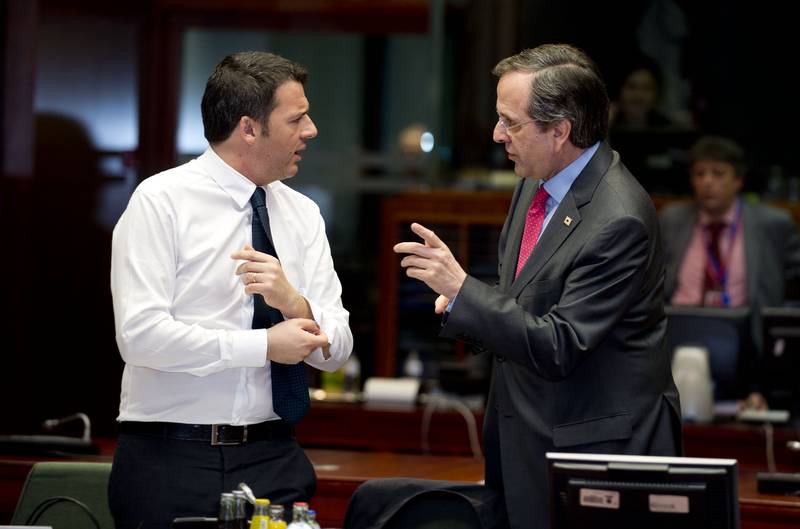 majority of Italians demonstrated "political intelligence" demanding new Europe and deep change deprived of the devastating populism.
majority of Italians demonstrated "political intelligence" demanding new Europe and deep change deprived of the devastating populism.
This is what is expected of Renzi in Europe, too - the only big EU member state (apart from Germany), among the Union's founders, to demonstrate sobriety in the election is Italy. Renzi seems too young and too artistic to fit in Sarkozy's shoes, but the historic moment requires of him exactly this. The June summit could prove much more crucial for the EU than that in June 2012 when the construction of the banking union was agreed - the biggest integrationist step since the Maastricht Treaty. Then will be counted the votes for reform of the EU with a loosening effect, for reform of the EU with a tightening effect and business as usual. In this entire debate, so deafening is the silence of the "new sector" of the Union.
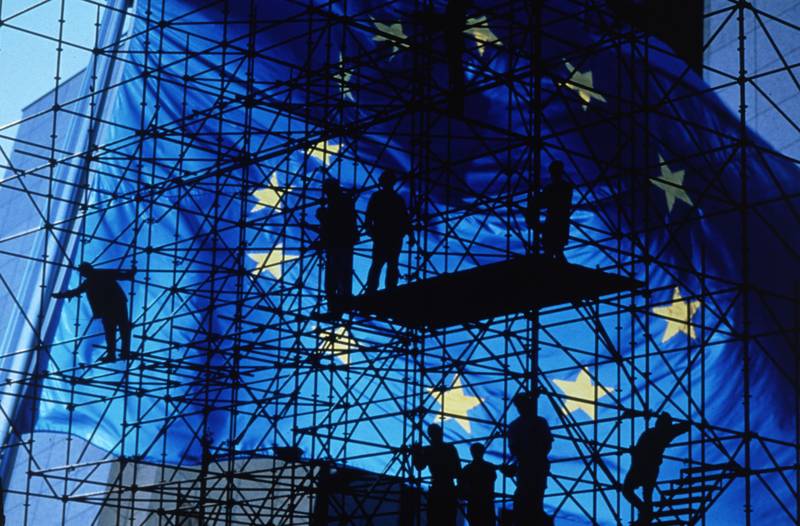 | © European Commission
| © European Commission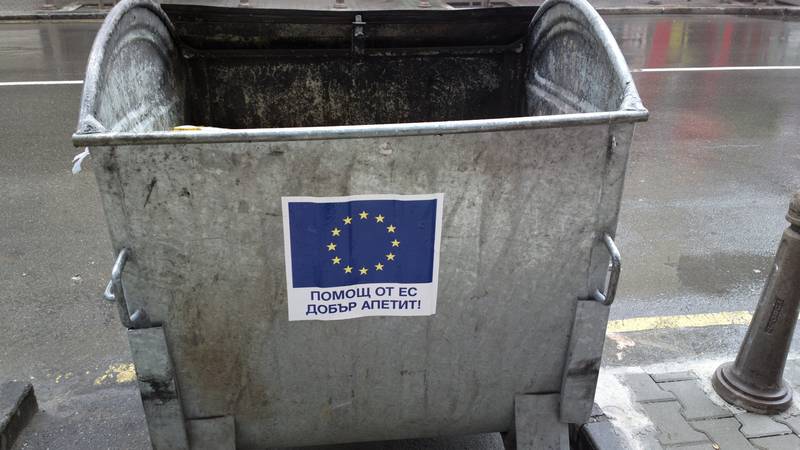 | © euinside
| © euinside Angela Merkel | © Council of EU
Angela Merkel | © Council of EU